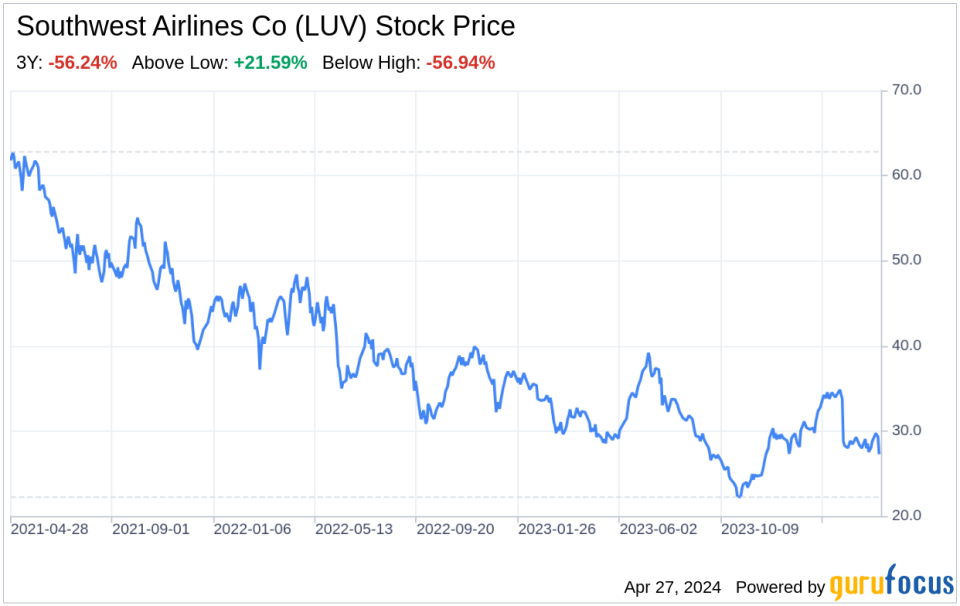Decoding Southwest Airlines Co (LUV): A Strategic SWOT Insight
Southwest Airlines Co (NYSE:LUV) maintains a robust brand presence and customer loyalty despite market challenges.
Operational disruptions and delivery delays pose significant threats to LUV's service efficiency and growth plans.
Strategic investments in sustainable aviation fuel (SAF) and cabin enhancements present new opportunities for differentiation.
Recent labor agreements and investments in customer experience signal proactive steps to leverage strengths and mitigate weaknesses.
On April 26, 2024, Southwest Airlines Co (NYSE:LUV), the largest domestic air carrier in the United States by passengers boarded, filed its 10-Q report with the SEC. This SWOT analysis delves into the financials and strategic positioning of LUV, as revealed in the filing. The company reported a notable increase in total operating revenues by $623 million, or 10.9 percent, year-over-year, indicating a resilient performance despite operational challenges. With a fleet of over 700 Boeing 737 aircraft, LUV continues to focus on operational excellence and reliability. However, the company faces headwinds from Boeing's delivery delays and the aftermath of a wide-scale operational disruption in late 2022, which impacted bookings and increased expenses by approximately $55 million in the first quarter of 2023.

Strengths
Brand Loyalty and Customer Base: Southwest Airlines Co (NYSE:LUV) has cultivated a strong brand image synonymous with affordable travel and customer-centric policies. The company's "Transfarency" philosophy, which emphasizes low fares with no hidden fees, has earned it a loyal customer base. This brand equity is a critical asset that allows LUV to maintain a competitive edge in the low-cost carrier market.
Financial Resilience: Despite the operational challenges, LUV's financial resilience is evident in its revenue growth. The company's ability to increase operating revenues amidst industry-wide adversities showcases its robust business model and effective cost management strategies. This financial stability provides LUV with the flexibility to navigate market fluctuations and invest in growth initiatives.
Operational Efficiency: LUV operates with a point-to-point network, which reduces the complexities associated with hub-and-spoke models used by many competitors. This operational strategy enhances flight frequency, minimizes aircraft turnaround time, and improves overall efficiency, contributing to LUV's strength in the industry.
Weaknesses
Operational Disruptions: The operational disruption in late 2022, caused by extreme winter weather, led to over 16,700 flight cancellations and a deceleration in bookings. These events not only resulted in immediate financial losses but also damaged LUV's reputation for reliability, which could have long-term implications on customer trust and preference.
Dependence on Single Aircraft Type: LUV's all-Boeing 737 fleet, while beneficial for maintenance and training efficiencies, also poses a risk. The reliance on a single aircraft type makes LUV vulnerable to issues specific to the Boeing 737, such as the recent delivery delays and the grounding of the 737 MAX in the past.
Labor Costs: The recent ratification of labor contracts, while ensuring employee satisfaction, has led to significant payouts. The $1.35 billion paid as a ratification bonus to Pilots in the first quarter of 2024 is indicative of the rising labor costs that could impact LUV's profitability and pricing competitiveness.
Opportunities
Sustainable Aviation Fuel (SAF) Investments: LUV's establishment of Southwest Airlines Renewable Ventures, LLC (SARV) and investments in SAF technology providers like LanzaJet, Inc., and SAFFiRE Renewables, LLC, position the company at the forefront of sustainability in aviation. These initiatives align with LUV's goal to replace 10 percent of its total jet fuel consumption with SAF by 2030, offering a competitive advantage in an increasingly eco-conscious market.
Customer Experience Enhancements: LUV's plans to redesign aircraft cabins and introduce new seats, along with enhanced WiFi and onboard power ports, signal a commitment to improving the customer experience. These enhancements could attract more passengers and potentially generate additional revenue streams.
Network Optimization: LUV's strategic decision to cease operations in underperforming markets and restructure others, such as Atlanta and Chicago, demonstrates a proactive approach to optimizing its network. This could lead to improved operational efficiency and profitability.
Threats
Boeing Delivery Delays: The ongoing delays in aircraft deliveries from Boeing pose a significant threat to LUV's growth and fleet modernization plans. These delays could restrict LUV's capacity to expand its network and meet market demand, potentially leading to lost revenue opportunities.
Regulatory and Legal Challenges: LUV is subject to various legal proceedings and claims, such as the class action litigation under the USERRA, which could result in financial penalties and damage the company's reputation. Additionally, the outcome of governmental inquiries and investigations following the December 2022 operational disruption remains uncertain and could have adverse effects.
Competitive Landscape: The airline industry is highly competitive, with carriers constantly vying for market share. LUV must continuously innovate and adapt to maintain its position, especially as competitors introduce new services, pricing strategies, and technological advancements.
In conclusion, Southwest Airlines Co (NYSE:LUV) exhibits strong brand loyalty, financial resilience, and operational efficiency, which are crucial for sustaining its leadership in the low-cost carrier segment. However, the company must address weaknesses such as operational disruptions, dependence on a single aircraft type, and rising labor costs. Opportunities in sustainable aviation and customer experience enhancements present avenues for growth, while threats from Boeing delivery delays, regulatory challenges, and intense competition require vigilant management. LUV's strategic investments and network optimization efforts are commendable steps toward leveraging its strengths and mitigating its weaknesses, positioning the company for continued success in a dynamic industry
This article, generated by GuruFocus, is designed to provide general insights and is not tailored financial advice. Our commentary is rooted in historical data and analyst projections, utilizing an impartial methodology, and is not intended to serve as specific investment guidance. It does not formulate a recommendation to purchase or divest any stock and does not consider individual investment objectives or financial circumstances. Our objective is to deliver long-term, fundamental data-driven analysis. Be aware that our analysis might not incorporate the most recent, price-sensitive company announcements or qualitative information. GuruFocus holds no position in the stocks mentioned herein.
This article first appeared on GuruFocus.

 Yahoo Finance
Yahoo Finance 